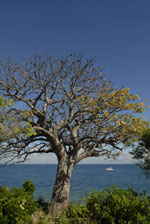

MadagascarMadagascar is a large Island off the East coast of Africa in the Indian Ocean with an incredible diversity of wildlife and flora of which 80% is endemic to Madagascar. Madagascar’s landscapes, people, beaches and undiscovered areas will delight those with a taste for discovery. A holiday to Madagascar can expose you to mountains, rain forest, dazzling beaches & coral reef surrounded by clear warm waters. |
Madbookings.com |
 |
 |
Home Page | Mozambique | Zanzibar | Madagascar | Namibia | Kruger Park | South Africa |
Wildlife | Bush & Beach | Diving | Honeymoons | Tropical Islands | Cruises | Guided Safaris | Car Hire |
|
|
Madagascar General InformationMadagascar Time Zone: GMT + 3 Madagascar Official Languages: Malagasy (which is related to Indonesian) and French. Local dialects are also spoken. English is not widely spoken but increasing in the main tourist areas. Madagascar Power Supply: Mostly 220 volts AC, 50Hz. Religion on Madagascar: Just over 50% (+- 52%) follow animist beliefs; just over 40% (+-41%)Christian; the remainder of the population are Muslim. International Dialling code for Madagascar: +261 Madagascar CurrencyThe pre-colonial Ariary (MGA; symbol Ar) replaced the Malagasy Franc (MGF) in 2003. Note that the new Ariary is worth five times the FMG amount, and both currencies are shown on the notes. Notes are in denominations of Ar10,000, 5,000, 2,000, 1,000, 500, 200
and 100. Approximate exchange rate (Jan 2009) subject to daily change:
We recomend you change some money into Ariary at the airport Bureau de Charge on arrival in Madagascar. NOTE: DO NOT TAKE SOUTH AFRICAN RANDS. Euros are the most widely accepted currncy for exchange. VISA cards are accepted at some Madagascar hotels - other credit cards including Mastercard are NOT widely accepted in Madagascar. Madagascar WeatherThe Madagascar weather is incredibly varied due to the size and diversity of the Island of Madagascar. Southern Madagascar crosses the tropic of Capricorn leaving most of the country of Madagascar in the Indian ocean equatorial tropic region.
The south and west regions are hot and dry. Madagascar enjoys 7 to 8 hours of sunshine daily throughout the year. Visas and Entry Requirements for MadagascarAll visitors to Madagascar require a passport valid for 9 months after date of entry and visa as well as a return or onward ticket. Visa’s to Madagascar are also required by all nationals, to obtain a visa you will need: - Valid passport Approximate visa cost guide as at Oct 2008: US$ 95 per person or R750 in South Africa Madagascar visa’s are available on arrival at the International airport in Antananarivo for some nationalities - however it is strongly recommended to obtain a visa prior to this. Contact your nearest Madagascar embassy for further information before departure. Click
here to find your nearest Madagascar Embassy Malagasy consulates in Johannesburg South Africa or Durban South Africa issue one month visas for any passport holder. A valid passport is required. Madagascar CuisineIn Madagascar, eating well means eating a lot. Malagasy cooking is based on a large serving of rice with a dressing of sauces, meat, vegetables and spicy seasoning. The people of Madagascar enjoy very hot food and often serve dishes with hot peppers. True to its reputation as the Vanilla Island, many of the country's desserts are flavoured with vanilla. Local restaurants are often referred to as hotely. The choice of beverages is limited. National specialties: • Ro (beef and pork marinated in vinegar, water and oil,
then cooked with leaves, onion, pickles and other vegetables and
seasoned with pimento). National drinks: • Malagasy drinks include litchel (an aperitif made from
lychees). Tipping: Not customary, although waiters expect 10% of the bill Madagascar History, CUlture and PeopleMadagascar has a population of approximately 19 million people. The Madagascans are extremely hospitable and welcoming, although their relaxed attitude to time (public forms of transport, for example, will not generally move until they are full – no matter how long it takes to fill the last seat) may be frustrating. Dress is casual, except for the very smartest hotel and restaurant functions. Visitors are advised not to wear any military-style clothing; locally it is disapproved of and could lead to detention. Entertaining is done in restaurants and bars, and a good degree of acquaintance is necessary before being invited to a family home. Gifts should be offered if staying at a local village, particularly to the village headman, although monetary contributions will be seen as an insult. Respect should be paid to the many local taboos (fady) – but as these vary from region to region this is not always easy; however, it is clear that advice should be sought before approaching tombs and graves. It remains the practice in some regions (though it is increasingly rare due to the enormous cost) to invite an ancestor to a village celebration, disinterring the body so that the ancestor may attend physically, and later re-interring the body with new shrouds; this traditional observance (known as famadihana) demonstrates the continuing hold of traditional beliefs. Visitors invited to such an occasion should consider it a great honour. A republic since 1992 it gained Independence from France in 1960
The official languages are Malagasy (which is related to Indonesian)
and French. Local dialects are also spoken. English is not widely
spoken but increasing in the main areas. |
            |